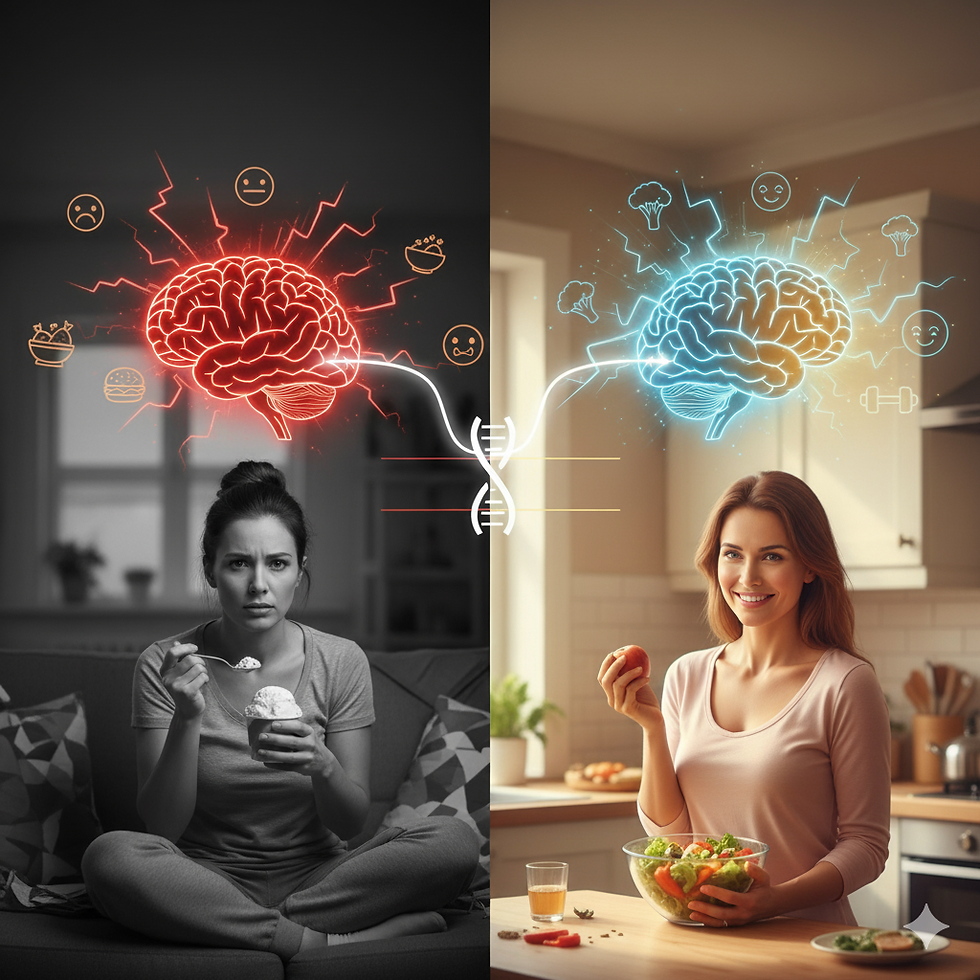The Science Behind Emotional Eating: How Stress Hormones Shape Your Cravings
- Dr Titilayo Akinsola

- Nov 12, 2025
- 4 min read
Introduction
If you’ve ever found yourself reaching for chocolate after a long day or craving salty snacks when stressed, you’ve experienced the powerful connection between emotion, stress, and appetite.
This isn’t just about willpower. It’s about biology.
At Favor Mental Health, we help clients understand that emotional eating is not a failure of discipline—it’s a physiological and psychological response designed by your body to help you cope.
But when stress becomes chronic, your hormones can turn those coping mechanisms into unwanted cravings, weight gain, and emotional exhaustion.
Let’s unpack the science behind why that happens—and how to regain control.

How Stress Alters the Brain-Body Connection
When your brain detects stress—whether from a looming deadline or an emotional conflict—it activates the hypothalamic-pituitary-adrenal (HPA) axis.
This releases cortisol, your body’s primary stress hormone. Cortisol plays a key role in your “fight or flight” system—but it also has an important side effect: it increases appetite, especially for high-calorie foods.
Research published in Psychoneuroendocrinology shows that chronic stress elevates cortisol levels, leading to higher intake of foods rich in sugar and fat—your body’s quick fuel.
Cortisol doesn’t act alone. It also interacts with:
Insulin, which promotes fat storage after eating.
Ghrelin, the “hunger hormone,” which rises when stressed.
Dopamine, the “reward neurotransmitter,” which creates comfort and pleasure when eating.
Together, they form a powerful biological trio that says: Eat now. Feel better later.
Why Comfort Foods Feel So Comforting
When you eat something sweet, fatty, or carb-heavy, your brain releases dopamine and serotonin—neurochemicals that temporarily soothe anxiety and sadness.
That’s why emotional eating often feels effective in the moment. You’re not weak; your brain is doing its job—trying to bring you back to emotional equilibrium.
However, this relief is short-lived. As blood sugar spikes and falls, so does your mood. Soon, you’re left not only with stress but also guilt, fatigue, and a stronger urge to repeat the behavior.
This is how emotional eating becomes a learned loop:
Stress → Eat → Relief → Guilt → More stress → Eat again
The Role of Sleep and Hormones
Sleep deprivation is one of the most underappreciated triggers for emotional eating.Studies from the American Journal of Clinical Nutrition reveal that even one night of poor sleep can elevate ghrelin (hunger hormone) by 28% and decrease leptin (satiety hormone) by 18%.
When tired, your prefrontal cortex—the part of the brain responsible for decision-making and impulse control—goes offline. That’s why late-night snacking or emotional overeating often happens after long, exhausting days.
Sleep, therefore, isn’t just rest—it’s an appetite regulator.
The Psychological Side: Stress and Emotional Triggers
While biology sets the stage, psychology directs the play.
Common emotional triggers include:
Loneliness or boredom: Food fills emotional emptiness.
Anger or frustration: Eating becomes a form of self-soothing.
Happiness and celebration: Food reinforces pleasure and belonging.
Fatigue and burnout: Food provides stimulation and energy.
When these emotions go unaddressed, eating becomes the default response.
At Favor Mental Health, we teach clients to differentiate emotional hunger from physical hunger:
Physical hunger builds gradually and can be satisfied with any food.
Emotional hunger is sudden, urgent, and specific—often tied to cravings like sweets or chips.
Emotional Eating Is a Health Signal, Not a Moral Failing
Your body isn’t betraying you—it’s sending a message.
Emotional eating often signals:
Unprocessed stress or trauma
Emotional suppression (“I can’t show weakness”)
Lack of emotional outlets
Chronic fatigue or burnout
Rather than focusing on restriction, we guide clients to explore the root emotion behind the behavior. Healing begins when you stop judging the symptom and start understanding the cause.
Rebalancing Your Mind-Body Connection
To regulate emotional eating, you must calm the stress response before it drives behavior.
Here are several approaches proven to help:
1. Mindful Breathing & Grounding
Before eating, take three deep breaths.Ask: Am I truly hungry, or am I seeking comfort?
2. Structured Self-Care
Sleep: Aim for 7–9 hours nightly
Hydration: Dehydration mimics hunger
Movement: Exercise lowers cortisol and boosts endorphins
3. Emotional Awareness Techniques
Use the HALT method: Ask if you’re Hungry, Angry, Lonely, or Tired. Often, it’s one of the last three.
4. Therapy and Professional Support
At Favor Mental Health, we provide cognitive-behavioral therapy (CBT) and emotion-focused strategies that help retrain your response to stress—so food becomes fuel again, not comfort.
Key Takeaways
Emotional eating is biologically driven by stress hormones, not weakness.
Cortisol, insulin, and dopamine form the stress-eating triad.
Chronic stress and poor sleep amplify cravings and emotional hunger.
True healing requires emotional regulation, not calorie restriction.
Mindful awareness and therapy can break the stress-eating cycle safely.
If you find yourself eating to cope with stress or mood changes, it’s time to address the deeper connection between your emotions, hormones, and habits.
At Favor Mental Health, we help you decode your body’s messages, manage stress effectively, and rebuild a healthier relationship with food and yourself.
📍 Suite 9B, 260 Gateway Drive, Bel Air, MD 21014
📞 410-403-3299
Your cravings aren’t random. They’re your body’s language—let’s help you understand what it’s saying.




Comments